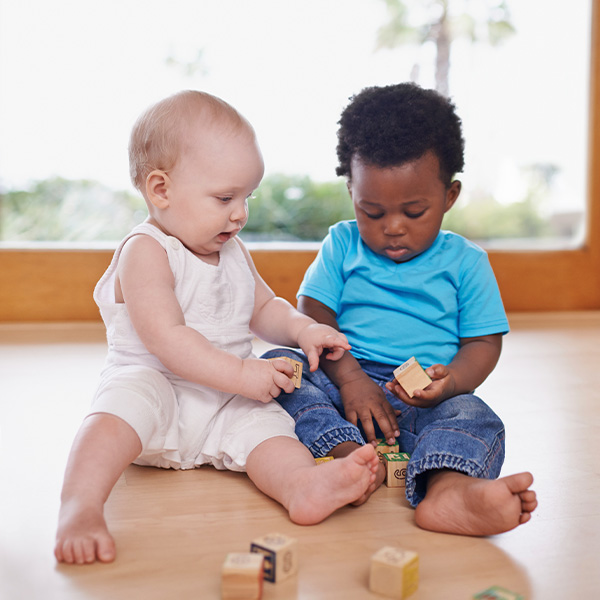Play is all about having fun! Any activity, organized or unstructured, your child finds fun and enjoyable is considered play. But play is much more than just a fun activity for your child! As a child grows they go through different stages of play development.
 While playing, children learn and develop important skills they will continue to use throughout their lifetime. Problem solving, creativity, and willingness to take risks are just a few of the skills developed through play. Children who use their imagination and ‘play pretend’ in safe environments are able to learn about their emotions, what interests them, and how to adapt to situations. When children play with each other, they are given the opportunity to learn how to interact with others and behave in various social situations.
While playing, children learn and develop important skills they will continue to use throughout their lifetime. Problem solving, creativity, and willingness to take risks are just a few of the skills developed through play. Children who use their imagination and ‘play pretend’ in safe environments are able to learn about their emotions, what interests them, and how to adapt to situations. When children play with each other, they are given the opportunity to learn how to interact with others and behave in various social situations.
Be sure to give your child plenty of time and space to play. There are 6 stages of play during early childhood, all of which are important for your child’s development. All of the stages of play involve exploring, being creative, and having fun. This list explains how children’s play changes by age as they grow and develop social skills.
- Unoccupied Play (Birth-3 Months):
At this stage baby is just making a lot of movements with their arms, legs, hands, feet, etc. They are learning about and discovering how their body moves. - Solitary Play (Birth-2 Years):
This is the stage when a child plays alone. They are not interested in playing with others quite yet. - Spectator/Onlooker Behavior (2 Years):
During this stage a child begins to watch other children playing but does not play with them. - Parallel Play (2+ Years):

When a child plays alongside or near others but does not play with them this stage is referred to as parallel play. - Associate Play (3-4 Years):
When a child starts to interact with others during play, but there is not a large amount of interaction at this stage. A child might be doing an activity related to the kids around him, but might not actually be interacting with another child. For example, kids might all be playing on the same piece of playground equipment but all doing different things like climbing, swinging, etc. - Cooperative Play (4+ years):
When a child plays together with others and has interest in both the activity and other children involved in playing they are participating in cooperative play.
Play starts when we are babies, but it does not stop there! Including play in your child’s daily routine and giving them time to play is important for their development at every age. These stages are general guidelines for what to expect of your child’s play skills, but remember every child is different and if you have concerns bring them up with your healthcare provider.
Article provided by Pathways.org
